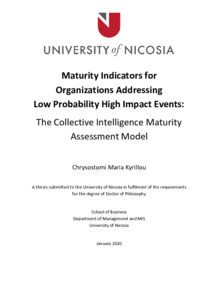- Kyrillou, Chrysostomi Maria
- School of Business
- Department of Management
- January 2020
- English
- 409 pages
- Kokkinaki, Angelika | Kleanthous, Stella | Koutsoullis, Michalis
- Collective Intelligence (CI) | Maturity Assessment Models | Collective Intelligence Maturity Assessment (CIMA) Model | Transactive Memory Systems (TMS) | Collective Performance | Low Probability High Impact Events (LoPHIEs) | Decision Making
- Management and MIS | Business Administration
-
-
This Thesis examines Collective Intelligence as a systemic dimension that can provide organizations addressing Low Probability High Impact Events (LoPHIEs), with an assessment of their maturity levels. Three main themes- Decision Making, Collective Intelligence (CI), and Maturity Assessment Models- were examined, for the first time jointly, to compose a Collective Intelligence Maturity (CIMA) Model. Indicators and factors, which are of critical importance for the evolution and maturation of Collective Intelligence in teams and Collective Performance in relation to the management of LoPHIEs, are investigated at both a theoretical and empirical level. Three interconnected experiments were conducted, and primary data were collected. Following that, the analysis of the primary data led to a new model for maturity assessment. This model has resulted following a design science research methodology, with two iterations of the development cycle. During the first development cycle, an initial design of the CIMA Model has been proposed. In addition, an initial analysis of the primary data collected was performed and resulted into the identification of additional factors, which in turn advised the second iteration of the development cycle, where an improved design of the CIMA Model has been presented and a complete analysis of the primary data has been conducted. In the last phase of the second development cycle, the results of the data analysis were taken into consideration, and a final design of the CIMA Model has been presented. The final design integrates in full the maturity of the phenomenon under study. Consequently, the present study aims to enlarge the existing body of knowledge in the subject area and offer strategic decision-making support for the successful and sustainable management of LoPHIEs.
-
Maturity Indicators for Organizations Addressing Low Probability High Impact Events: The Collective Intelligence Maturity Assessment Model
Main Files
| Type | Location | Link |
|---|---|---|
| dissertation | [More information] |


